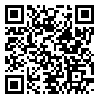مجله رویش روانشناسی از دادن گواهیهای کاغذی معذور است. لطفا تقاضا نکنید. همه گواهی ها در صفحه شخصی کاربران موجود است.
year 13, Issue 10 (Winter 2024-2025 2024)
Rooyesh 2024, 13(10): 121-130 |
Back to browse issues page
Download citation:
BibTeX | RIS | EndNote | Medlars | ProCite | Reference Manager | RefWorks
Send citation to:



BibTeX | RIS | EndNote | Medlars | ProCite | Reference Manager | RefWorks
Send citation to:
Qanbary Joopish M, Aparkhide N, Mousavi S M. (2024). The relationship between perceived stress and nomophobia with the mediating role of social support in students. Rooyesh. 13(10), 121-130.
URL: http://frooyesh.ir/article-1-5504-en.html
URL: http://frooyesh.ir/article-1-5504-en.html
1- Master of Clinical Psychology, Department of Psychology, Tonekabon Branch, Islamic Azad University, Tonekabon, Iran.
2- Master of Guidance and Counseling, Department of Counseling, Science And Research Branch, Islamic Azad University, Tehran. Iran.
3- Assistant Professor of Health Psychology, Department of Nursing and Midwifery, Rasht Branch, Islamic Azad University, Rasht, Iran. ,mousavi.msc@gmail.com
2- Master of Guidance and Counseling, Department of Counseling, Science And Research Branch, Islamic Azad University, Tehran. Iran.
3- Assistant Professor of Health Psychology, Department of Nursing and Midwifery, Rasht Branch, Islamic Azad University, Rasht, Iran. ,
Abstract: (1458 Views)
The present study was conducted to determine the relationship between perceived stress and nomophobia and the mediating role of social support in students. The present research was a descriptive-correlation type of structural equation modeling. The statistical population of this research was the students of Islamic Azad University, Rasht branch in 2023. 220 students were selected by the available sampling method. Participants completed an online survey and completed the Perceived Stress Scale (PSS; Cohen et al., 1983), the Nomophobia Questionnaire (NMP-Q; Yildirim & Correia, 2015), and the Multidimensional Perceived Social Support Scale (MSPSS; Zimet et al., 1988) answered. Data analysis was done using structural equation modeling. The fit indices indicated that the proposed model had a good fit. The results showed that perceived stress positively and social support negatively had a direct effect on nomophobia; Also, perceived stress negatively had a direct and significant effect on social support (P<0.05). Also, the results of the bootstrap test showed that social support played a mediating role between perceived stress and nomophobia (P<0.05). The results of this research indicated that the perceived stress directly or the mediating role of social support affected nomophobia.
Type of Article: Research |
Subject:
Clinical Psychology
Received: 2024/07/5 | Accepted: 2024/07/27 | ePublished: 2024/12/30
Received: 2024/07/5 | Accepted: 2024/07/27 | ePublished: 2024/12/30
Send email to the article author
| Rights and permissions | |
 |
This work is licensed under a Creative Commons Attribution-NonCommercial 4.0 International License. |





